 By Bob Currie, Vessel Examiner
By Bob Currie, Vessel Examiner
United States Coast Guard Auxiliary Flotilla 081-06-08
School has started again, and that puts us toward the end of the recreational boating season, although the fishing season is about to start. We have had some great rescue success stories, and we have had some heartbreaking losses. This column will cover some lessons to be learned from this season’s incidents, both good and bad.
Flotilla 081-06-08 is based at Coast Guard Station Galveston. The Coast Guard Auxiliary is the uniformed civilian component of the US Coast Guard and supports the Coast Guard in nearly all mission areas. The Auxiliary was created by Congress in 1939. For more information, please visit www.cgaux.org.
Rip Currents
Rip currents have claimed the lives of several people in our area of the Gulf of Mexico this season. The shape of our seabed is very conducive to the formation of rip currents; that is, it very gradually becomes deeper and has several shallow cuts and dips. The poster here should be a good reminder of how to deal with rip currents. Kayakers have been lost due to rip currents because they panicked and fought the current.
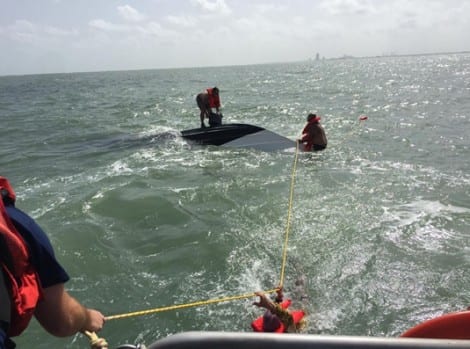
Stay with the Boat
If you capsize, and boats have capsized many times in our area, stay with the boat if it doesn’t sink below the water. Just the stress of trying to swim to shore can be enough to cause a heart attack or an asthma attack, both of which can be lethal. It also makes rescue more difficult when rescuers have to search for those who have swum off from the boat for one reason or another. We had one success story just recently because the passengers remained with their capsized boat. They knew from training that they should remain with the boat, and that training paid off. Earlier in the summer a passenger tried to swim to shore on Lake Conroe when his boat capsized, and he was overcome and died even though he had a life vest on.
Wear Your Life Vest
We had a boat capsize recently, and no one was wearing life vests. One of the passengers dove underneath the boat, searched through some lockers, and returned with life vests for everyone. Then everyone had to put their life jackets on in heavy seas. We had a boater arrive at the dock only to find that one of his passengers was missing. 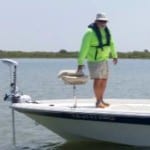 His passenger was not wearing a life vest. The boat operator had no idea when he lost his passenger, so the search was quite lengthy and involved several agencies. His body was eventually found. We had two guys go over the side of their sailboat to clear a line from their auxiliary engine propeller. One was wearing a life jacket, and the other was not. I think you can guess which one survived when that sailboat sail suddenly caught the wind and pulled the boat away from the sailors. When an accident happens is NOT the time to don a life jacket. As mentioned in a previous column, even SUPs (standup paddle boards) require that a life vest be on board for each person. It does no good unless it is being worn, however. As the picture shows, I prefer a self-inflating life jacket. You don’t even realize you have it on, and if you go overboard it inflates automatically.
His passenger was not wearing a life vest. The boat operator had no idea when he lost his passenger, so the search was quite lengthy and involved several agencies. His body was eventually found. We had two guys go over the side of their sailboat to clear a line from their auxiliary engine propeller. One was wearing a life jacket, and the other was not. I think you can guess which one survived when that sailboat sail suddenly caught the wind and pulled the boat away from the sailors. When an accident happens is NOT the time to don a life jacket. As mentioned in a previous column, even SUPs (standup paddle boards) require that a life vest be on board for each person. It does no good unless it is being worn, however. As the picture shows, I prefer a self-inflating life jacket. You don’t even realize you have it on, and if you go overboard it inflates automatically.
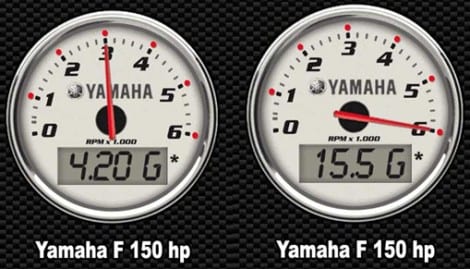
Conserve Your Fuel
How would you like to run out of gas on a jet ski and spend the night trying to stay awake so that searchers can find you in the morning? It happened. Know how much fuel your craft consumes at different engine speeds and in different types of water (calm, choppy, stormy, etc.). As a rule of thumb, use one third of your fuel to go out, one third to get back in, and save one third for reserve. Know that you consume much more fuel when operating in moderate seas than when operating in calm seas. A typical fuel usage program demonstrates that cutting back to half throttle drastically cuts fuel consumption.
Properly Program Your Marine Radio
A DSC/VHF marine radio, when combined with the Coast Guard’s Rescue 21 initiative, can be a great advantage for boaters. For starters, it can greatly reduce the time it will take the Coast Guard to find you in case of an emergency. Secondly, in case of emergency, your radio will tell the Coast Guard vital information about you: information like the name and description of your boat, exactly where you are located, even who to contact in case of emergency.  The system is automatic; it will continue to transmit information even if you can’t man your radio. Finally, it’s simple to use. Even guests on your boat can make this easy call for help in a crisis. However, during my Vessel Safety Checks this year, 8 out of 10 radios with DSC (Digital Selective Calling) were not programmed with the boat’s Maritime Mobile Service Identity (MMSI) or the boat’s information. Just recently a boat in trouble tried to use the Distress button on their marine radio, only to find that pushing the button did nothing. It wasn’t programmed. They were lucky that they finally got a call out on the distress channel, channel 16. One passenger called 911, and the 911 operator assumed their call was a hoax and hanged up on him. Years ago, or should I say decades ago, a CB radio on a boat could reach the Coast Guard. Not today. The Coast Guard does not monitor CB radio or cell phone frequencies.
The system is automatic; it will continue to transmit information even if you can’t man your radio. Finally, it’s simple to use. Even guests on your boat can make this easy call for help in a crisis. However, during my Vessel Safety Checks this year, 8 out of 10 radios with DSC (Digital Selective Calling) were not programmed with the boat’s Maritime Mobile Service Identity (MMSI) or the boat’s information. Just recently a boat in trouble tried to use the Distress button on their marine radio, only to find that pushing the button did nothing. It wasn’t programmed. They were lucky that they finally got a call out on the distress channel, channel 16. One passenger called 911, and the 911 operator assumed their call was a hoax and hanged up on him. Years ago, or should I say decades ago, a CB radio on a boat could reach the Coast Guard. Not today. The Coast Guard does not monitor CB radio or cell phone frequencies.
Put an ID Sticker on Your Kayak
Recently a kayak was found washed up on the beach near my house. The Coast Guard was called, and we launched a 45-foot rapid response boat and a helicopter to search for a possible kayaker in trouble on the water. No one was found, and there was no identification on the kayak. No one knew who owned the kayak, so there was no place to start looking other than to begin a search pattern in the vicinity of where the kayak was found. The search was called off with no resolution. Since then, I have passed out a couple of dozen of the ID stickers shown here.
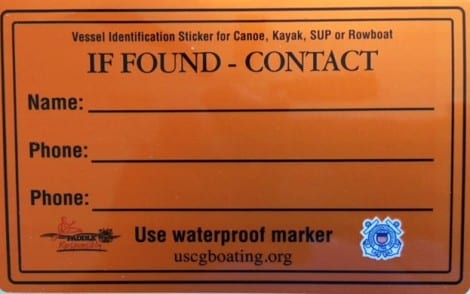
I still have plenty. By placing contact information on your paddle craft you can save rescue agencies such as the Coast Guard a lot of time and the expense of searching for a vessel operator whenever a boat is found floating or beached if the boat simply floated away from the dock.
For more information on boating safety, please visit the Official Website of the U.S. Coast Guard’s Boating Safety Division at www.uscgboating.org. Questions about the US Coast Guard Auxiliary or our free Vessel Safety Check program may be directed to me at [email protected]. I am available to perform free Vessel Safety Checks, and I will come to your location to perform them. SAFE BOATING!
[8-27-2018]

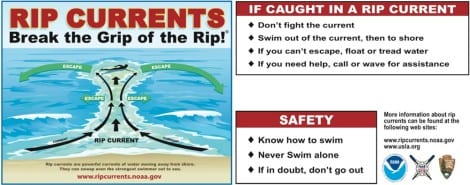
 Posted in
Posted in 























